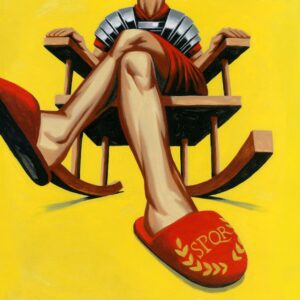
ILLUSTRATION: THOMAS FUCHS
From the Song Dynasty to the American Civil War, governments have experimented with ways to support retired soldiers and workers
April 6, 2023
“Will you still need me, will you still feed me,/When I’m sixty-four?” sang the Beatles in their 1967 album Sgt. Pepper’s Lonely Hearts Club Band. These were somewhat hypothetical questions at a time when the mean age of American men taking retirement was 64, and their average life expectancy was 67. More than a half-century later, the Beatles song resonates in a different way, because there are so few countries left where retirement on a state pension at 64 is even possible.
Historically, governments preferred not to be in the retirement business, but self-interest sometimes achieved what charitable impulses could not. In 6 A.D., a well-founded fear of civil unrest encouraged Augustus Caesar to institute the first state pension system, the aerarium militare, which looked after retired army veterans. He earmarked a 5% tax on inheritances to pay for the scheme, which served as a stabilizing force in the Roman Empire for the next 400 years. The Sack of Rome in 410 by Alaric, leader of the Visigoths, probably could have been avoided if Roman officials had kept their promise to pay his allied troops their military pensions.
In the 11th century, the Song emperor Shenzong invited the brilliant but mercurial governor of Nanjing, Wang Anshi, to reform China’s entire system of government. Wang’s far-reaching “New Laws” included state welfare plans to care for the aged and infirm. Some of his ideas were accepted but not the retirement plan, which achieved the remarkable feat of uniting both conservatives and radicals against him: The former regarded state pensions as an assault on family responsibility, the latter thought it gave too much power to the government. Wang was forced to retire in 1075.
Leaders in the West were content to muddle along until, like Augustus, they realized that a large nation-state requires a national army to defend it. England’s Queen Elizabeth I oversaw the first army and navy pensions in Europe. She also instituted the first Poor Laws, which codified the state’s responsibility toward its citizens. The problem with the Poor Laws, however, was that they transferred a national problem to the local level and kept it there.
Before he fell victim to the Terror during the French Revolution, the Marquis de Condorcet tried to figure out how France might pay for a national pension system. The question was largely ignored in the U.S. until the Civil War forced the federal government into a reckoning. A military pension system that helped fewer than 10,000 people in 1861 grew into a behemoth serving over 300,000 in 1885. By 1894 military pensions accounted for 37% of the federal budget. One side effect was to hamper the development of national and private pension schemes. Among the few companies to offer retirement pensions for employees were the railroads and American Express.
By the time Frances Perkins, President Franklin Roosevelt’s Labor Secretary, ushered in Social Security in 1935, Germany’s national pension scheme was almost 50 years old. But the German system started at age 70, far too late for most people, which was the idea. As Jane Austen’s Mrs. Dashwood complained in “Sense and Sensibility,” “People always live forever when there is an annuity to be paid to them.” The last Civil War pensioner was Irene Triplett, who died in 2020. She was receiving $73.13 every month for her father’s Union service.







